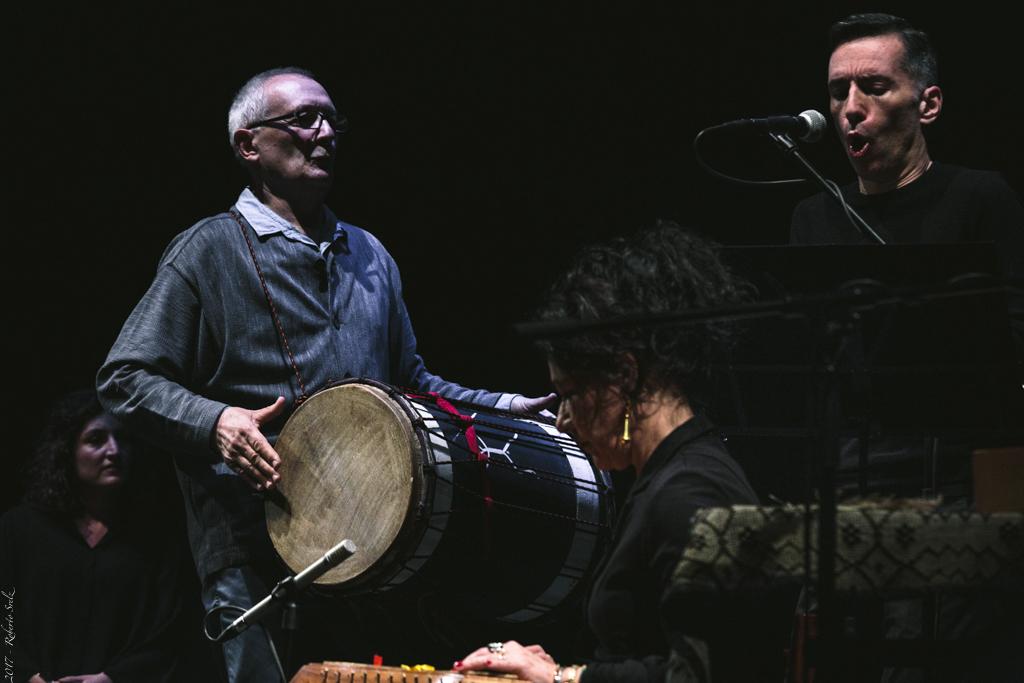
L’acqua e la sete
Unanswered tears
Beñat Achiary – voce e percussioni
Julie Calbete – voce
Paola Erdas – voce, clavicymbalum e salterio
Stefano Cirino – chitarra
Sergio Ladu – voce e direzione
– Improvvisazione (BeñatAchiary)
– Ombre (Maria Carta. [1934-1994])
– Stances amoureuses (Marguerite de Navarre [1492-1549])
– Txoria txori (Joxean Artze [1939] – Mikel Laboa [1934-2008])
– Lettura tratta da Passavamo sulla terra leggeri (Sergio Atzeni [1952-1995])
– Cantilena (tradizionale sarda)
– Boghe ‘e riu (G. M. Dettori e M. Carta da tradizionale sardo)
– Improvvisazione (BeñatAchiary)
– Cristalino (Horacio Salinas [1951-])
– Canto medievale basco (Bernard d’ Etchepare [1480-1545])
– Canto della Sibilla (tradizionale di Alghero)
La Sardegna e i Paesi Baschi: un’isola del Mediterraneo, una regione bagnata dall’Atlantico. Due mondi distanti l’uno dall’altro ma egualmente fieri e custodi della loro particolare identità, ai quali una lingua inaccessibile ai profani, sembra conferire un isolamento feroce.
Il colore speciale di questi idiomi che sono il basco ed il sardo riporta all’orecchio profano l’esistenza di un universo raro che una vita cosmopolita e sradicata tende a far dimenticare.
Resi più consapevoli delle loro fragilità anche per le vicissitudini della storia e della modernità, sardi e baschi sanno far parlare le forze vitali della natura, attraverso la loro lingua nelle quali musicalità e poesia accendono sia l’asprezza che la capacità di seduzione.
La terra natale modella l’uomo come l’acqua forma l’argilla e l’uomo accetta di soffrire per la sua terra, di riceverne la violenza. Si nutre e si disseta presso di essa così come ne accetta le aridità, le durezze. Ecco allora la sete di avventura, di opportunità, di emancipazione, di libertà, metafore che si fanno sintesi della condizione umana.
Thierry Santurenne
Versione italiana di Sergio Ladu
Sardinia and the Basque Country: one, an island in the Mediterranean; the other, a region battered by the Atlantic. Two worlds apart, but each equally proud of its unique identity, and each with a language inaccessible to the stranger which seems to impose a fierce isolation. But these are just appearances: the strange colours of these rare tongues that are Sardinian and Basque remind the outsider of the existence of a universe that cosmopolitan and rootless lives tend to forget; one in which the taste of the earth is alive, lashed by rain and ocean spray or burned by the torches of the sun. Made more aware of their fragility through the savage blows of both history and the present, the Sardinian and the Basque cultures are adept at letting the vital force of nature speak, in languages with a music as equally suited to bitterness as to seduction. Our homeland forms us, as water shapes clay: in return we are ready to suffer for that land, to receive its gifts as well as the blows, to allow the land to quench – or make us suffer – thirst, thirst for adventure, for escape, for liberation. An essence of the human condition.
Thierry Santurenne